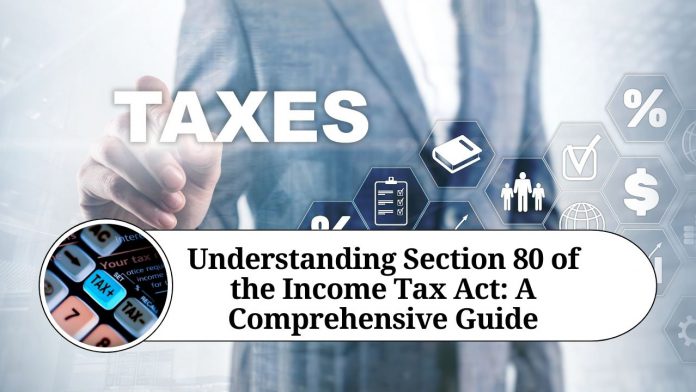The Income Tax Act of India provides various provisions for taxpayers to save on their tax liability. One such provision is Section 80 of the Income Tax Act. Section 80 provides a list of deductions that taxpayers can claim to reduce their taxable income. Let’s delve deeper into Section 80 and understand its provisions.
What is Section 80 of the Income Tax Act?
Section 80 of the Income Tax Act provides a list of deductions that taxpayers can claim to reduce their taxable income. These deductions are available for individuals, Hindu Undivided Families (HUFs), and firms. The deductions under this section are allowed from the gross total income of the taxpayer before the calculation of tax liability.
What are the deductions under Section 80?
Section 80 provides for various deductions, which are as follows:
- Section 80C: This section provides for deductions on investments made in specified instruments such as Public Provident Fund (PPF), Employee Provident Fund (EPF), Equity-Linked Saving Scheme (ELSS), National Savings Certificate (NSC), and others. The maximum deduction limit under this section is Rs. 1.5 lakhs.
- Section 80CCC: This section provides for deductions on payments made towards pension schemes. The maximum deduction limit under this section is Rs. 1.5 lakhs.
- Section 80CCD: This section provides for deductions on contributions made towards the National Pension Scheme (NPS). The maximum deduction limit under this section is Rs. 1.5 lakhs.
- Section 80D: This section provides for deductions on medical insurance premiums paid for self, spouse, and dependent children. The maximum deduction limit under this section is Rs. 25,000. Additionally, an additional deduction of Rs. 25,000 is available on medical insurance premiums paid for parents. In case the parents are senior citizens, the limit increases to Rs. 50,000.
- Section 80DD: This section provides for deductions on medical expenses incurred on dependents with a disability. The maximum deduction limit under this section is Rs. 75,000.
- Section 80DDB: This section provides for deductions on medical expenses incurred on specified diseases such as cancer, chronic renal failure, and others. The maximum deduction limit under this section is Rs. 1 lakh.
- Section 80E: This section provides for deductions on interest paid on education loans. The deduction is available for a maximum of 8 years.
- Section 80G: This section provides for deductions on donations made to specified charitable institutions. The maximum deduction limit under this section is 50% or 100% of the donation amount, depending on the institution.
- Section 80GG: This section provides for deductions on rent paid by taxpayers who do not receive HRA (House Rent Allowance). The maximum deduction limit under this section is Rs. 60,000.
- Section 80TTA: This section provides for deductions on interest earned on savings accounts. The maximum deduction limit under this section is Rs. 10,000.
- Section 80TTB: This section provides for deductions on interest income earned by senior citizens. The maximum deduction limit under this section is Rs. 50,000.
Who can claim deductions under Section 80?
All individuals, HUFs, and firms can claim deductions under Section 80. However, the eligibility for claiming deductions under specific sections may vary based on the taxpayer’s age, income, and other criteria. For example, senior citizens can claim deductions under Section 80TTB, while taxpayers who do not receive HRA can claim deductions under Section 80GG.
Read more useful content:
- section 234e of income tax act
- section 286 of income tax act
- section 90a of income tax act
- section 40a(7) of income tax act
- section 226(3) of income tax act
- section 24 of income tax act
Frequently Asked Questions (FAQs)
Q. What is Section 80 of the Income Tax Act?
Section 80 of the Income Tax Act provides for various deductions that taxpayers can claim to reduce their taxable income.
Q. Who can claim deductions under Section 80?
All individuals, Hindu Undivided Families (HUFs), and firms can claim deductions under Section 80.
Q. What are the deductions available under Section 80?
Section 80 provides for various deductions such as Section 80C, Section 80CCC, Section 80CCD, Section 80D, Section 80DD, Section 80DDB, Section 80E, Section 80G, Section 80GG, Section 80TTA, and Section 80TTB.
Q. What is the maximum deduction limit under Section 80C?
The maximum deduction limit under Section 80C is Rs. 1.5 lakhs.
Q. What is the maximum deduction limit under Section 80D?
The maximum deduction limit under Section 80D is Rs. 25,000. Additionally, an additional deduction of Rs. 25,000 is available on medical insurance premiums paid for parents. In case the parents are senior citizens, the limit increases to Rs. 50,000.
Q. Can I claim deductions under Section 80 for donations made to any charitable institution?
No, deductions under Section 80G are available only for donations made to specified charitable institutions.
Q. Can I claim deductions under Section 80G for donations made in cash?
No, deductions under Section 80G are available only for donations made through banking channels or cheque.




















